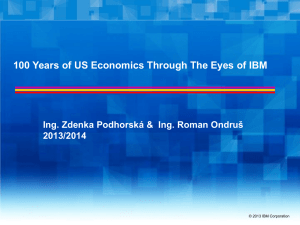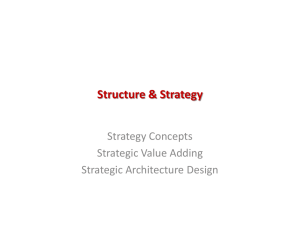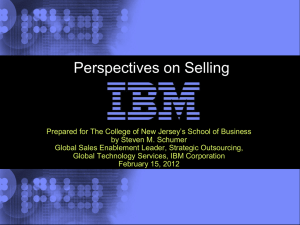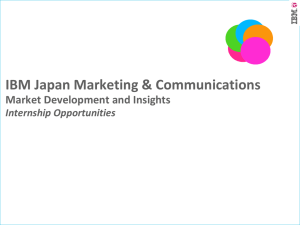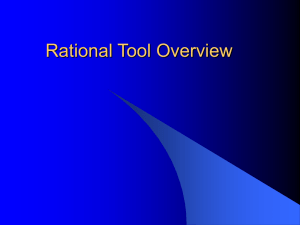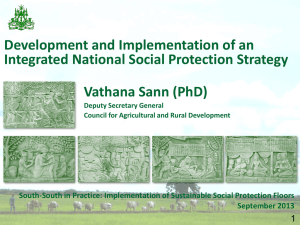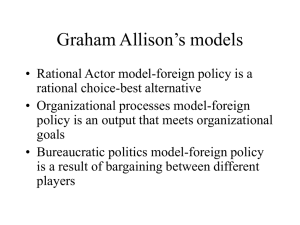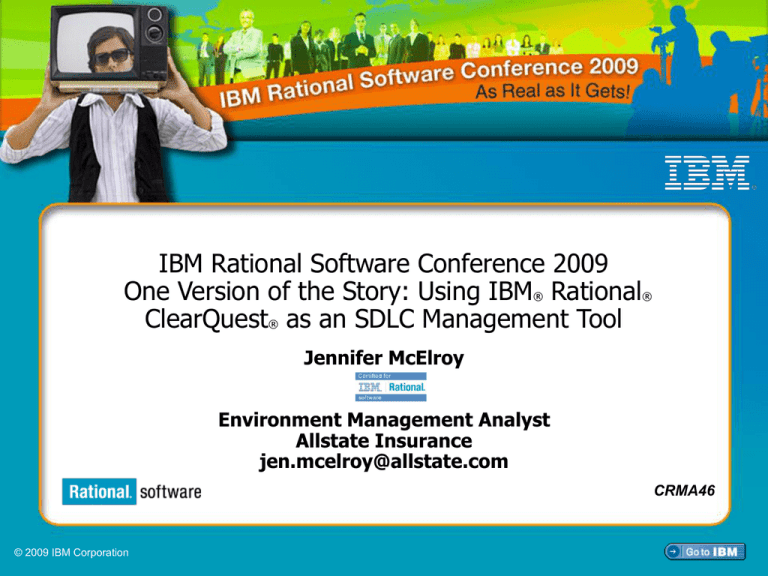
IBM Rational Software Conference 2009
One Version of the Story: Using IBM® Rational®
ClearQuest® as an SDLC Management Tool
Jennifer McElroy
Environment Management Analyst
Allstate Insurance
jen.mcelroy@allstate.com
CRMA46
© 2009 IBM Corporation
IBM Rational Software Conference 2009
Tracking Changes
Question: Where are you tracking your changes, issues, risks, etc??
Microsoft Excel
Word document on a share drive
Database that was created for a specific application
One or more ‘other’ defect/change tracking tools
Posted as a ‘blog’ on a Windows SharePoint website
Post-it Notes on a wall
Now, how do you gather metrics on everything your Requirements, Development,
Quality, Environment or Change Management teams are working on?
Even bigger than that – how do you gather those metrics for globally distributed
teams who are generating 40-50 releases per year?
CRMA46 - One Version of the Story: Using IBM(R) Rational(R) ClearQuest(R) as an SDLC Management
Tool
2
IBM Rational Software Conference 2009
Agenda
Background
Allstate Implementation
Details of Implementation
DEMO
Sample Timelines and Cost
Lessons Learned/Conclusion
Questions and Answers
About the Speaker
About Allstate Insurance
Our Environment
CRMA46 - One Version of the Story: Using IBM(R) Rational(R) ClearQuest(R) as an SDLC Management
Tool
3
IBM Rational Software Conference 2009
About the Speaker
Certified as an IBM® Rational® ClearQuest® Administrator since 2006
An IBM® Rational® ClearQuest® Administrator for over eight years
Working with IBM® Rational® ClearQuest® in both a multisite and non-multisite
environments
Written hook code in VB and PERL; most recently in PERL
Everything in the schema being discussed today is written in PERL
Working with IBM® Rational® ClearCase® for approximately six years
developerWorks Articles:
Enterprise Software Release Management (co-author) http://www.ibm.com/developerworks/rational/library/06/0925_lipien-haines-gan/
Accessing the ClearCase Automation Library from ClearQuest hooks (author) http://www.ibm.com/developerworks/rational/library/07/0410_haines/
Please feel free to stop me anytime to ask questions
CRMA46 - One Version of the Story: Using IBM(R) Rational(R) ClearQuest(R) as an SDLC Management
Tool
4
IBM Rational Software Conference 2009
Allstate Insurance
The Allstate Corporation is the nation’s largest publicly held personal lines insurer.
A Fortune 100 company, with $156.4 billion in assets, Allstate® sells 13 major
lines of insurance, including auto, property, life and commercial. Allstate® also
offers retirement and investment products and banking services. Allstate® is
widely known through the “You’re In Good Hands With Allstate®” slogan.
Allstate is reinventing protection and retirement to help individuals in
approximately 17 million households protect what they have today and better
prepare for tomorrow.
CRMA46 - One Version of the Story: Using IBM(R) Rational(R) ClearQuest(R) as an SDLC Management
Tool
5
IBM Rational Software Conference 2009
Our Environment
Offshore servers for IBM® Rational® ClearQuest® running Windows 2003 with MS
SQL Server 2005
Mastering site runs on MS SQL Server 2005 database cluster and has a separate
Windows 2003 server to process IBM® Rational® ClearQuest® Multisite® jobs
Each replica site has IBM® Rational® ClearQuest® Web running on a Windows 2003
server
Each site has a team that range from 5-250+ people
We are currently running version 7.0.1.0 with IBM® Rational® ClearQuest®
Multisite®
in the process of testing and upgrading to 7.1
IBM® Rational® ClearQuest® is integrated with IBM® Rational® ClearCase®
CRMA46 - One Version of the Story: Using IBM(R) Rational(R) ClearQuest(R) as an SDLC Management
Tool
6
IBM Rational Software Conference 2009
Agenda
Background
Allstate Implementation
Details of Implementation
DEMO
Sample Timelines and Cost
Lessons Learned/Conclusion
Questions and Answers
Benefits of this type of implementation
State-based Record Types
Stateless Record Types
CRMA46 - One Version of the Story: Using IBM(R) Rational(R) ClearQuest(R) as an SDLC Management
Tool
7
IBM Rational Software Conference 2009
Benefits
Transfer records between teams
Development > Environment
Implement processes that provide a “natural flow” from one team to the next
Multiple people working on one change
Assists in Global Delivery
Ensure that all work is accounted for in a release
Track your issues and risks in the same place as your changes and defects – because one might affect the other
Customizable choice lists
Some choice list items may be applicable to more than one group – so why not reuse them?
Choice list maintenance
Problems using CQ dynamic choice lists
Adding items
Removing items
Consistent processes and terminology between teams
Granular Reporting
Moves towards a more mature software configuration management process
Support and enable regulatory requirements like Sarbanes/Oxley Act of 2002 (SOX) and the Capability
Maturity Model Integration (CMMI)
Producing consistent metrics
Enforce repeatable processes
Capture Audit Trails
Increase speed-to-market
CRMA46 - One Version of the Story: Using IBM(R) Rational(R) ClearQuest(R) as an SDLC Management
Tool
8
IBM Rational Software Conference 2009
Record Types
Using a combination of stateful and stateless record types
Stateful record types
Using three stateful record types (Software Release, Incident and Work Request)
Relate to each other (parent to child and sibling to sibling)
Stateless record types
Used to control the choice lists that are presented to users
Using 26 stateless record types (too many to list here)
Using only a few dynamic lists for lists that rarely, if ever, change
Global PERL scripts are used to query for choice lists
Can be marked ‘Inactive’ so users are unable to select from a choice list
CRMA46 - One Version of the Story: Using IBM(R) Rational(R) ClearQuest(R) as an SDLC Management
Tool
9
IBM Rational Software Conference 2009
Stateless Record Types
Each Stateless record type has two standard fields
Business Unit Name
Status (Active or Inactive)
Can have relationship with other stateless record types
For example: We have environment and application server
Application server has a reference field to the environment record
Create/modify of stateless records is restricted to the group who ‘owns’ it
For example: Project Managers can create/update the Business Unit Project record type
A member of the Administrator group can also update any look-up record
CRMA46 - One Version of the Story: Using IBM(R) Rational(R) ClearQuest(R) as an SDLC Management
Tool
10
IBM Rational Software Conference 2009
Stateless Record Types (examples)
Business Unit Name
record
Business Unit
Application
Server record
CRMA46 - One Version of the Story: Using IBM(R) Rational(R) ClearQuest(R) as an SDLC Management
Tool
11
IBM Rational Software Conference 2009
Agenda
Background
Allstate Implementation
Details of Implementation
DEMO
Sample Timelines and Cost
Lessons Learned/Conclusion
Questions and Answers
Sample Choice List Script
Record Relationships
Stateful record type details
State Transitions
State based record field behavior
Creating Work Requests
Relating Records to each other
- One Version of the Story: Using IBM(R) Rational(R) ClearQuest(R) as an SDLC Management
Other fun featuresCRMA46
- Cloning
Records, Archiving Attachments
Tool
12
IBM Rational Software Conference 2009
Sample Choice List Script
sub CL_Bus_Unit_Name {
my @buchoices;
my $PresentAllChoices = $session->GetNameValue("ALLOW_INACTIVE_VAL");
if ($PresentAllChoices eq "yes") {
$is_active_value = "Active"
} else {
$is_active_value = "Inactive"
}
my $session = $entity->GetSession();
my $queryDef = $session->BuildQuery("Business_Unit");
$queryDef->BuildField("Bus_Unit_Name");
my $filter = $queryDef->BuildFilterOperator($CQPerlExt::CQ_BOOL_OP_AND);
$filter->BuildFilter("State",$CQPerlExt::CQ_COMP_OP_EQ, [$is_active_value]);
my $resultSet = $session->BuildResultSet($queryDef);
$resultSet->Execute();
while ($resultSet->MoveNext == $CQPerlExt::CQ_SUCCESS) {
my $busunit = $resultSet->GetColumnValue(1);
push (@buchoices, $busunit);
}
return @buchoices;
}
CRMA46 - One Version of the Story: Using IBM(R) Rational(R) ClearQuest(R) as an SDLC Management
Tool
13
IBM Rational Software Conference 2009
Record Relationships
Software Release Record
(Parent)
Incident Record
(Child, Parent, or Sibling)
Work Request
(Child)
CRMA46 - One Version of the Story: Using IBM(R) Rational(R) ClearQuest(R) as an SDLC Management
Tool
14
IBM Rational Software Conference 2009
Stateful record type details
Software Release (parent or grand-parent)
Specifies the release information
Release Manager, Pre-Production Deployment Date, Production Deployment Date, Type
of Release (Service Pack vs. Major Release), etc
Can have many children (Incidents)
CRMA46 - One Version of the Story: Using IBM(R) Rational(R) ClearQuest(R) as an SDLC Management
Tool
15
IBM Rational Software Conference 2009
Software Release Record State Transition
Resubmit
Submitted
Duplicate
Duplicate
Deferred
Declined
Defer
Assign
Decline
Assign
Work On
Worked On
Deploy
Deployed
Close
Closed
CRMA46 - One Version of the Story: Using IBM(R) Rational(R) ClearQuest(R) as an SDLC Management
Tool
16
IBM Rational Software Conference 2009
Stateful record type details (cont…)
Incident (the main record)
Differentiated by a field - Incident Type Code
An Incident can be a Defect, Change Request, Environment, Project, Issue, Risk, or
Config Management
Identifies the specifics about the request
Headline, Description, Owner, State, etc..
Must be related to Software Release Record
Can be related to other Incident records
Can have many children records (Work Requests)
Work Requests are created from an action (Create_Work_Request) on the Incident
record
Data is pre-populated from the Incident to the Work Request
User has no other interaction with the WR during the creation
Field behaviors are based on the Bus Unit Name and Incident Type Code
CRMA46 - One Version of the Story: Using IBM(R) Rational(R) ClearQuest(R) as an SDLC Management
Tool
17
IBM Rational Software Conference 2009
State based record field behavior
sub Incident_Field_Behavior {
my $incidentType = $entity->GetFieldStringValue("Incident_Type_Code");
@Man_Defect = ("Bus_Unit_Line_of_Bus_Name", "Bus_Unit_Channel_Name", "Bus_Unit_Line_Number", "Geographical_State",
"Bus_Unit_Company_Name", "Bus_Unit_Team_Name", "Identified_in_Build_Nbr", "Bus_Unit_App_Server_Name",
"Bus_Unit_Environment_Name", "Identified_in_Iteration",
"Identified_in_Test_Stage", "Bus_Unit_Project_Nbr",
"Bus_Unit_Transaction_Type");
@Opt_Defect = ("Bus_Unit_Area_Impact_Name", "USD_Last_Update_Date", "Impacted_Files", "Bus_Unit_Inc_Source",
"Risk_Category_Ind", "Help_Request_Code", "Risk_Impact_Code", "Risk_Mitigation_Text", "Next_Activity_Date",
"Risk_Probability_Code", "Risk_Rank_Code", "Required_Date", "Severity_Code", "Inc_Typ_Code_Subcat",
"Req_Team_Review_Ind", "Covered_in_Fixed_Price", "Deployment_Priority", "Impacts_UI_Ind", "Project_Active_Date",
"Bus_Unit_IntroPhase");
.....
@Man_Issue = ("Bus_Unit_Line_of_Bus_Name", "Bus_Unit_Channel_Name", "Bus_Unit_Line_Number", "Geographical_State",
"Bus_Unit_Company_Name", "Bus_Unit_Team_Name", "Next_Activity_Date", "Risk_Rank_Code", "Required_Date",
"Severity_Code", "Bus_Unit_Transaction_Type");
@Opt_Issue = ("Bus_Unit_Area_Impact_Name", "Identified_in_Build_Nbr", "Bus_Unit_App_Server_Name", "Bus_Unit_Environment_Name",
"Identified_in_Iteration", "Identified_in_Test_Stage", "USD_Last_Update_Date", "Impacted_Files",
"Bus_Unit_Inc_Source", "Risk_Category_Ind", "Help_Request_Code", "Risk_Impact_Code", "Risk_Mitigation_Text",
"Risk_Probability_Code", "Bus_Unit_Project_Nbr", "Inc_Typ_Code_Subcat", "Req_Team_Review_Ind",
"Covered_in_Fixed_Price", "Deployment_Priority", "Impacts_UI_Ind", "Project_Active_Date", "Bus_Unit_IntroPhase");
.....
if ($incidentType eq "Defect") {
foreach $field (@Man_Defect) { $entity->SetFieldRequirednessForCurrentAction($field, $CQPerlExt::CQ_MANDATORY)}
foreach $field (@Opt_Defect) { $entity->SetFieldRequirednessForCurrentAction($field, $CQPerlExt::CQ_OPTIONAL)}
} elsif ($incidentType eq "Issue") {
foreach $field (@Man_Issue) {$entity->SetFieldRequirednessForCurrentAction($field, $CQPerlExt::CQ_MANDATORY)}
foreach $field (@Opt_Issue) {$entity->SetFieldRequirednessForCurrentAction($field, $CQPerlExt::CQ_OPTIONAL)}
.....
CRMA46 - One Version of the Story: Using IBM(R) Rational(R) ClearQuest(R) as an SDLC Management
Tool
18
IBM Rational Software Conference 2009
Incident Record State Transition
Incident Record
Incident Record Type = Change Request
Type = Defect
Incident Record
Type = Defect
This workflow is conditional – based on the Incident Type Code
Incident Record
Type = Change Request
Clone
Clone
Submit
Submit
Resubmit
Resubmit
Submit
Very hard to show a visual representation of it
Duplicate
Submitted
Duplicate
Deferred
Duplicate
Submitted
Declined
Declined
Deferred
Duplicate
Analyzed
Analyzed
Duplicate
Defer
Defer
Decline
Client
Review
Decline
Analyze
Duplicate
Analyzed
Vs.
Slot
Ready
for Review
Client
Review
Approve
Re-Review
Approved
Approved
Re-Approve
Slot
Slotted
Slotted
Opened
Open
Open
Opened
Resolve
Resolve
Re-Open
Re-Open
Resolved
Resolved
Re-Open
Test
Test
Tested
Tested
In_Progress
In_Progress
Close
Close
Test In Progress
Closed
Close
Closed
CRMA46 - One Version of the Story: Using IBM(R) Rational(R) ClearQuest(R) as an SDLC Management
Tool
19
IBM Rational Software Conference 2009
Stateful record type details (cont…)
Work Request (Integrated with IBM® Rational® ClearCase® UCM®)
Easily created
Basically a disposable record since there is no interaction during submit
Minimal workflow
“Multiple owners”
More than one person can be working to resolve a defect or a change request, this
allows each developer to be able to check out/in code and have it associated with the
task (incident).
Captures all the change set information
CRMA46 - One Version of the Story: Using IBM(R) Rational(R) ClearQuest(R) as an SDLC Management
Tool
20
IBM Rational Software Conference 2009
Work Request State Transition
Re-Submit
Declined
Duplicated
Submitted
Duplicate
Assign
Reassign
Decline
Assigned
Open
Worked On
Re-WorkOn
Resolve
Resolved
Close
Closed
CRMA46 - One Version of the Story: Using IBM(R) Rational(R) ClearQuest(R) as an SDLC Management
Tool
21
IBM Rational Software Conference 2009
Creating Work Requests
Used to track the individual work for a larger item
Users create Work Requests from an action on the Incident record
Makes sure the records are related to each other
Doesn’t allow orphaned work requests out there
Allows the record to be created very quickly
No information to enter since it is contained in the parent record
Basically just telling the developer – OK, go check out the code for this project
Is used by the Business & System Analysts, Developers and Testers
Does not need to be associated with IBM® Rational® ClearCase® related changes
CRMA46 - One Version of the Story: Using IBM(R) Rational(R) ClearQuest(R) as an SDLC Management
Tool
22
IBM Rational Software Conference 2009
Relating Records
An Incident must be related to a Software Release record when the user takes the
“Slotted” action
Incidents can be related to other Incidents, Software Releases or Work Requests
Or a combination of all 3!
A Work Request can only be related to a single Incident
An Incident should only be related to a single Software Release
We do not have this coded currently
CRMA46 - One Version of the Story: Using IBM(R) Rational(R) ClearQuest(R) as an SDLC Management
Tool
23
IBM Rational Software Conference 2009
Cloning
Executed via a button on the Related Records Tab
Is a PERL script that uses the Build Entity feature
Copies the values from all fields in the existing record to the new record
Relates the records to one another
If successful, tells user the entity was cloned and gives the new ID #
If unsuccessful, tells the user why
CRMA46 - One Version of the Story: Using IBM(R) Rational(R) ClearQuest(R) as an SDLC Management
Tool
24
IBM Rational Software Conference 2009
Archiving Attachments
Regains used space
IBM® Rational® ClearQuest® Multisite® copies each attachment to each site
Improves Performance on queries
Prevents changes from being made when they shouldn’t be
Automated PERL script uses API
Moves any associated attachments to NAS space
Inserts a URL for each file into an “Attachment Log” field
In case the file needs to be accessed
Adds a note to indicate the attachment has been removed
CRMA46 - One Version of the Story: Using IBM(R) Rational(R) ClearQuest(R) as an SDLC Management
Tool
25
IBM Rational Software Conference 2009
CRMA46 - One Version of the Story: Using IBM(R) Rational(R) ClearQuest(R) as an SDLC Management
Tool
26
IBM Rational Software Conference 2009
Sample Timelines & Cost
Approximately 2 FTEs for 1500 hours
Majority of time is spent gathering requirements
Total Cost = hours * dollars/hour
$300,000 = 3000 (hours) * $100
Conversion (from old schema) required data manipulation as some fields changed
field types
CRMA46 - One Version of the Story: Using IBM(R) Rational(R) ClearQuest(R) as an SDLC Management
Tool
27
IBM Rational Software Conference 2009
Lessons Learned
Development team needs to understand the benefits of the Software Release
record and integrated software tools, processes and project management
discipline approach
Use standards where possible
Re-use things whenever possible
Avoid duplicating data, processes or code
Partner with an existing or establish a Governance Board for Software Tools and
Processes
Ensure the tool administrators understand the vision, the business environment
and constraints
Schedule requirements gathering sessions for several hours at a time
Eliminates having to review what was discussed and decided at the last meeting
Practice the conversion – document every step, every command before the actual
move
COMMUNICATE, COMMUNICATE, COMMUNICATE
People are generally resistant to change, having a lot of communication will make your users feel more comfortable with
what is about to happen
Celebrate your successes!
CRMA46 - One Version of the Story: Using IBM(R) Rational(R) ClearQuest(R) as an SDLC Management
Tool
28
IBM Rational Software Conference 2009
CRMA46 - One Version of the Story: Using IBM(R) Rational(R) ClearQuest(R) as an SDLC Management
Tool
29
IBM Rational Software Conference 2009
© Copyright IBM Corporation 2009. All rights reserved. The information contained in these materials is provided for informational purposes only, and is provided AS IS without warranty of any kind,
express or implied. IBM shall not be responsible for any damages arising out of the use of, or otherwise related to, these materials. Nothing contained in these materials is intended to, nor shall have
the effect of, creating any warranties or representations from IBM or its suppliers or licensors, or altering the terms and conditions of the applicable license agreement governing the use of IBM
software. References in these materials to IBM products, programs, or services do not imply that they will be available in all countries in which IBM operates. Product release dates and/or capabilities
referenced in these materials may change at any time at IBM’s sole discretion based on market opportunities or other factors, and are not intended to be a commitment to future product or feature
availability in any way. IBM, the IBM logo, Rational, the Rational logo, Telelogic, the Telelogic logo, and other IBM products and services are trademarks of the International Business Machines
Corporation, in the United States, other countries or both. Other company, product, or service names may be trademarks or service marks of others.
CRMA46 - One Version of the Story: Using IBM(R) Rational(R) ClearQuest(R) as an SDLC Management
Tool
30


